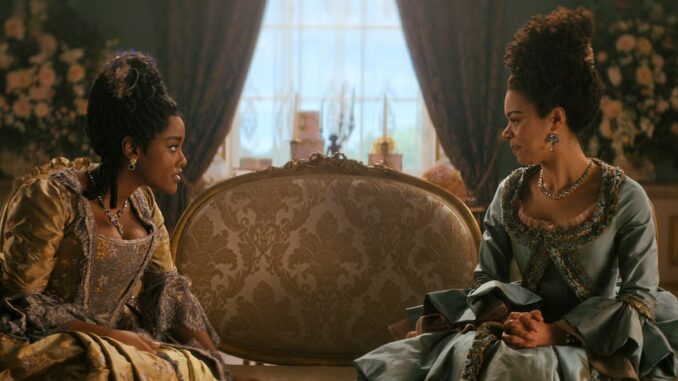
Immediately after each encounter with her husband, Agatha hurries to Coral, who draws a bath as the two discuss what happened. These light scenes take away from the gravity of the situation. In the first episode, Agatha reminds Coral that she needs a warning ahead of time when Danbury wants to bed her, suggesting it’s worse without one. As she scrubs the experience from her skin, Agatha rants mildly about it but in a casual way. The two women talk about the experience, but they approach it as a joke rather than the abuse it truly is. Quickly, the topic soon changes to the royal wedding, moving on entirely from what Agatha went through. In another such scene, Agatha’s complaining almost instantly dissolves into a discussion of the racial dynamic of their society faces. Applying a less-than-serious tone to things distracts from the overwhelmingly that Agatha lives with.
The same tone appears in the second episode when Agatha discusses sex with Charlotte. She describes her wedding night as “painful and terrifying” but assures the other girl that it’s okay for things to not be splendid. Considering how Agatha must have felt, her laugh as she recalls her honeymoon isn’t fitting. Again, this conversation tries to make jokes when there is nothing funny about Agatha’s situation. As she teaches Charlotte about sex, Agatha calls it a chore, admitting it was not something she ever considered enjoying, a mild description of what she is made to endure — though perhaps that was an intentional understatement for Charlotte’s benefit. Either way, how Agatha discusses the subject is strange for a show that usually applies modern morals to the period. The odd approach and dissonance of what happens on-screen verse the tone makes light of the subject.

Agatha Danbury’s Relationship with Lord Ledger Contrasts Her Marriage
By the end of the series, Agatha learns a little about love. After her husband’s death, she gets to know Lord Ledger (Keir Charles), her neighbor and father to Violet (Connie Jenkins-Greig). Initially, the pairing seemed odd, but as Ledger found himself trapped in an unhappy marriage, they easily found common ground, and it grew into more. They share a short but passionate affair, their sex directly contrasting Agatha and Danbury’s. She is no longer bored or uninterested, showing the importance of love, which Agatha has been denied for so long. Yet if the show had given a more detailed depiction of Agatha’s reaction to her suffering, it would have emphasized the difference in her finally being able to choose it on her own terms.
Despite how in control she seems in Bridgerton, Agatha has clearly faced hardships in her life, and Queen Charlotte is unafraid to show it. Yet the series doesn’t afford those moments the full emotional weight that they deserve. It was a strange choice to show the marital rape, not once but several times, and still have Agatha quietly resign to it — nor is the topic addressed with an appropriate tone. Fortunately, there is an end to Agatha’s suffering, and she experiences love, however briefly, in her dalliance with Lord Ledger. But if this prequel series makes one thing abundantly clear, it’s that Lady Agatha Danbury is stronger than anyone could have known.
